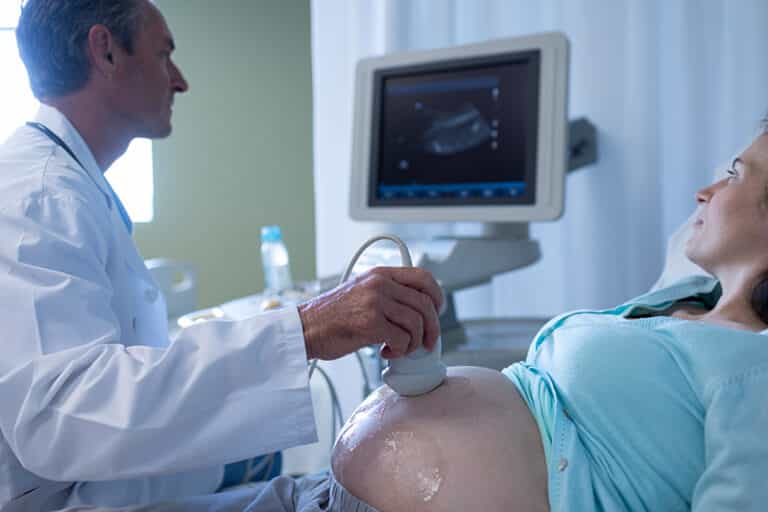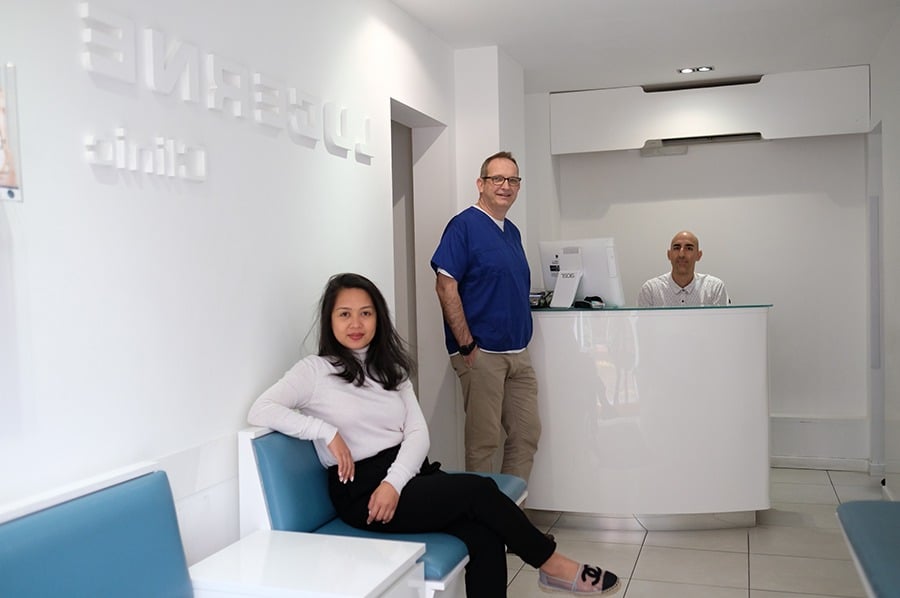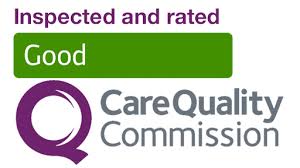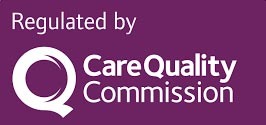What is an Early Pregnancy Scan?
The early pregnancy scan also called viability scan is an ultrasound test used in the first trimester to confirm a pregnancy and the unborn baby’s heartbeat.
You may be offered this scan if you had a positive pregnancy test and vaginal bleeding or spotting, or you are concerned due to previous pregnancy complications and risk of miscarriage. The early pregnancy scan is also known as baby viability scan is the first obstetric ultrasound and can provide the very much needed reassurance that the pregnancy is progressing normally, that it is intrauterine and not an ectopic.
When is the early scan performed?
This baby scan is performed between 6-11 weeks of pregnancy.
What Will an Early Pregnancy Scanning Show?
The main reason for this scan is to confirm pregnancy location, viability and date of the pregnancy.
The foetus changes rapidly from week to week in the early stages of pregnancy, so what you will see on the screen is depending on your gestation age.
When Can You Have an Early Pregnancy Scan?
This pregnancy scan can detect the embryonic heartbeat as early as 6 weeks of pregnancy. Scans performed prior to 6 weeks gestation are likely to be inconclusive.
What Will an Ultrasound Show at 3 Weeks Pregnant?
Nothing really. You should wait until you are at least 6 weeks pregnant.
Can I Have an Early Scanning at 5 Weeks?
Yes, you can have a baby scan at 5 weeks but we do not recommend a scan before the 6 weeks gestation unless you are worried about a miscarriage or an ectopic pregnancy, as at 5 weeks the scan will more likely be inconclusive and follow up scan will be required in 7-14 days to confirm the pregnancy’s location and foetal viability.
Can a 5 Week Pregnancy Be Seen on Ultrasound?
No, it is too early. You should be at least 6 weeks pregnant to be able to confidently confirm pregnancy by ultrasound.
Can You See a Heartbeat at 5 Weeks?
No, You can not see heartbeat on ultrasound at 5 weeks gestation.
Is 6 Weeks Too Early For Pregnancy Scanning?
Pregnancy in most cases can be confirmed on scan from as early as 6 weeks from the first day of your last menstrual period (LMP). For more information read our 6-week pregnancy scan article.
What Can You See at a 6 Week Ultrasound?
At 6 weeks, you won’t, in general, be able to see much detail of your baby. The ultrasound scan, however, should be able to confirm the gestation age by measuring either the gestation sac or the foetal pole if visible. Sometimes, but not always, you will be able to see the baby’s heartbeat. For more information read our 6 week pregnancy scan article.
Is 7 Weeks Too Early For an Ultrasound?
7 weeks is definitely not too early to see your baby, b. To find out more about this scan visit our article about the 7 week pregnancy scan.
How long will the scan take?
The actual scan usually takes around 5-10 minutes, depending on the gestation age and viability. At this tender, early stage is important to keep the exposure to the foetus at the minimum.
Is it Worth Getting an Early Pregnancy Scan?
The NHS believes that you only need two pregnancy scans during your pregnancy a 12 week and a 20-week scans. The early scan is however worth it if:
- you suffered from previous miscarriage or recurrent miscarriages,
- you want to visually confirm your pregnancy and see your baby for the first time
- you concerned about the health of the baby or
- you just need that reassurance as it can feel that it is long wait until your 12 week scan
- you are having fertility treatment and scabs are required to monitor the progress.
Can an ultrasound scan harm me or my baby?
Ultrasound scans have been used in antenatal care for more than 30 years, and there are no known health risks for either the baby or the mother if they undergo an obstetric ultrasound scan during pregnancy. However, it’s always best to weigh up any potential benefits against the risk when deciding whether to go ahead with such scans.
How to prepare for your Early Pregnancy Scan?
We require a full bladder for this early pregnancy scan, so you need to drink 1/2lt (1 pint) of water an hour before your scan.
How is the Early Pregnancy Scan performed?
Before the ultrasound scan, the sonographer will explain the examination procedure.
This test can be transabdominal or/and transvaginal.
In some instances, an internal or vaginal ultrasound may be required to see all the necessary detail or if your womb tilts backwards.
To perform this private baby scan, you will be asked to lie down on the examination couch and expose your lower abdomen.
A small amount of water-based gel will be applied to your skin. The gel will help the transducer to make good contact with the skin. The ultrasound transducer will be placed on the body and will be moved in different directions over the area of interest to obtain the required information/ultrasound images.
There is usually no discomfort from the procedure. However, if scanning is performed over an area of tenderness, you may feel pressure or minor discomfort from the transducer or probe as it is sometimes known.
Once the high-frequency ultrasound scanning is completed, the clear ultrasound gel will be wiped off your skin. Any portions that are not wiped off will dry quickly. The ultrasound gel does not usually stain or discolour clothing.
This ultrasound examination is typically completed within 10-15 minutes. After an ultrasound examination, you should be able to resume your normal activities immediately.
What happens at an early internal vaginal scan?
When it’s time to begin the procedure, you lie down on your back on the exam table and bend your knees. There may or may not be stirrups.
The ultrasound transducer will be covered with a probe cover and sterile lubricating ultrasound gel, and then inserts it into your vagina.
You might feel some pressure as your doctor inserts the transducer. This feeling is similar to the pressure felt during a Pap smear when your doctor inserts a speculum into your vagina.
Once the transducer is inside you, high-frequency sound waves bounce off your internal organs and transmit pictures of the inside of your pelvis onto a monitor.
The ultrasound probe will be moved in different directions as to obtain the best ultrasound images possible.
If you prefer, you may insert the transducer yourself, otherwise, the person conducting the examination will do this.
A third person may be present during the examination, acting as a chaperone if required by the sonographer or yourself.
You may request the examination to be stopped at any time during the procedure.
Read more about the transvaginal scan.
Is an internal vaginal ultrasound necessary during a routine pregnancy ultrasound?
It is only necessary if the abdominal ultrasound is inconclusive.
What if I were to receive unexpected news?
Unfortunately, very often, the ultrasound scan findings might show that the pregnancy is not progressing as expected. There are multiple reasons for this such as dating discrepancy or due to the health of the pregnancy such as a miscarriage.
We follow the national guidelines and depending on the findings we will recommend the appropriate referral pathway.
Can I bring family or friends with me when I have the scan?
Yes. You can bring someone with you to the scan appointment.
At the time of writing due to coronavirus, there are changes in the hospital visiting policies, so please check before your appointment.
Positive pregnancy test but no baby on ultrasound
There are various reasons why you might have a positive pregnancy test but no foetal pole is seen during the ultrasound. The most common explanation is that you are below 6 weeks. Another possible explanation is that the appearances are due to early foetal demise.
Why do people have private scans?
The main reasons parents opt for a private early scan is due to convenience and the absence of waiting times.
How much do private early scans cost?
There is a large variation in the price of the non-NHS early pregnancy scans. The main reasons for this is the location and the time allocated to the appointment.










